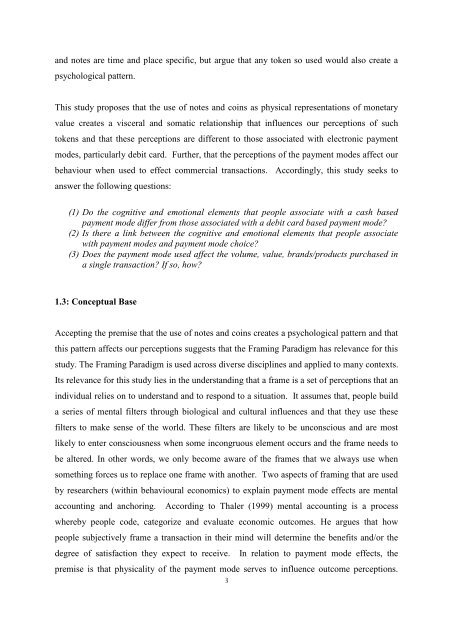Cash or Card: Consumer Perceptions of Payment Modes - Scholarly ...
Cash or Card: Consumer Perceptions of Payment Modes - Scholarly ...
Cash or Card: Consumer Perceptions of Payment Modes - Scholarly ...
Create successful ePaper yourself
Turn your PDF publications into a flip-book with our unique Google optimized e-Paper software.
and notes are time and place specific, but argue that any token so used would also create a<br />
psychological pattern.<br />
This study proposes that the use <strong>of</strong> notes and coins as physical representations <strong>of</strong> monetary<br />
value creates a visceral and somatic relationship that influences our perceptions <strong>of</strong> such<br />
tokens and that these perceptions are different to those associated with electronic payment<br />
modes, particularly debit card. Further, that the perceptions <strong>of</strong> the payment modes affect our<br />
behaviour when used to effect commercial transactions. Acc<strong>or</strong>dingly, this study seeks to<br />
answer the following questions:<br />
(1) Do the cognitive and emotional elements that people associate with a cash based<br />
payment mode differ from those associated with a debit card based payment mode?<br />
(2) Is there a link between the cognitive and emotional elements that people associate<br />
with payment modes and payment mode choice?<br />
(3) Does the payment mode used affect the volume, value, brands/products purchased in<br />
a single transaction? If so, how?<br />
1.3: Conceptual Base<br />
Accepting the premise that the use <strong>of</strong> notes and coins creates a psychological pattern and that<br />
this pattern affects our perceptions suggests that the Framing Paradigm has relevance f<strong>or</strong> this<br />
study. The Framing Paradigm is used across diverse disciplines and applied to many contexts.<br />
Its relevance f<strong>or</strong> this study lies in the understanding that a frame is a set <strong>of</strong> perceptions that an<br />
individual relies on to understand and to respond to a situation. It assumes that, people build<br />
a series <strong>of</strong> mental filters through biological and cultural influences and that they use these<br />
filters to make sense <strong>of</strong> the w<strong>or</strong>ld. These filters are likely to be unconscious and are most<br />
likely to enter consciousness when some incongruous element occurs and the frame needs to<br />
be altered. In other w<strong>or</strong>ds, we only become aware <strong>of</strong> the frames that we always use when<br />
something f<strong>or</strong>ces us to replace one frame with another. Two aspects <strong>of</strong> framing that are used<br />
by researchers (within behavioural economics) to explain payment mode effects are mental<br />
accounting and anch<strong>or</strong>ing. Acc<strong>or</strong>ding to Thaler (1999) mental accounting is a process<br />
whereby people code, categ<strong>or</strong>ize and evaluate economic outcomes. He argues that how<br />
people subjectively frame a transaction in their mind will determine the benefits and/<strong>or</strong> the<br />
degree <strong>of</strong> satisfaction they expect to receive. In relation to payment mode effects, the<br />
premise is that physicality <strong>of</strong> the payment mode serves to influence outcome perceptions.<br />
3

















